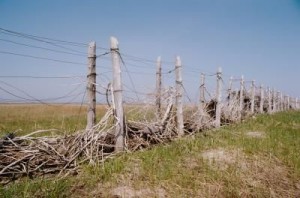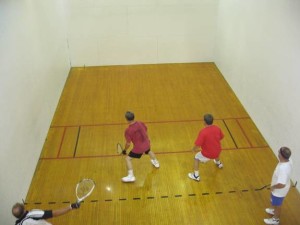 A few years ago I witnessed a parable in a parade as two floats rolled by me in the midst of the local Fourth of July parade. “Lady Luck,” shapely and seductive, painted on the side of a huge Bud Lite truck slowly rolled past. The truck pulled a trailer promoting a local radio station. The trailer was loaded with young women who were beautiful, tan, and wore skimpy swimwear, and with young men who were muscled and handsome. All were lounging and listening to the music pulsating through two gigantic speakers. They smiled and waved, as was their job, while many in the crowd yelled, whooped, or even danced to the music.
A few years ago I witnessed a parable in a parade as two floats rolled by me in the midst of the local Fourth of July parade. “Lady Luck,” shapely and seductive, painted on the side of a huge Bud Lite truck slowly rolled past. The truck pulled a trailer promoting a local radio station. The trailer was loaded with young women who were beautiful, tan, and wore skimpy swimwear, and with young men who were muscled and handsome. All were lounging and listening to the music pulsating through two gigantic speakers. They smiled and waved, as was their job, while many in the crowd yelled, whooped, or even danced to the music.
The float that followed was a simple flat-bed trailer pulled by a pickup. On the trailer was a small group of people in blue jean shorts and t-shirts. With their clarinets, trumpets, trombones and other instruments, they played an unpolished but hearty “Onward Christian Soldiers.” The Salvation Army Band. The contrasting sounds were disorienting. The loud inviting sounds from the beer float filled most of the air, but the steady music of the little brass band held its own. Neither was trying to drown out the other. They were simply two groups putting their lives to music and leaving me with one of those head-scratching moments.
Here was a moving exhibit of a fundamental struggle for our nation and for most of us as individuals I suspect. The struggle is not between Christianity and the beer or entertainment industry, nor is it a struggle between good and evil. That’s too easy. And besides, most of us can’t tell the difference between good and evil in the short run. Rather, the struggle I saw was about what gets our attention, because what gets our attention shapes our choices.
This seems relevant in the wake of the recent Independence Day celebrations and accompanying parades. For many people, the notion of freedom is simply, “I can do what I like with my life. I am free to make my own choices.” These choices range from what toothpaste to buy, to what career to pursue.
 But the truth behind those beliefs about freedom is that as we make choices, life begins to take shape around those choices. Life begins to build up around those choices the way the sand and tumbleweed in west Texas can build up around fence posts and can over time change the landscape around it. Pretty soon, undetected because the drift is so gradual, life as we know it has become the result of those choices. In fact, the choices we were once free to make begin to shape and dictate subsequent choices. Freedom soon becomes necessity. Sure, we’re still free to make different choices, but it becomes increasingly difficult to deviate from those previous choices.
But the truth behind those beliefs about freedom is that as we make choices, life begins to take shape around those choices. Life begins to build up around those choices the way the sand and tumbleweed in west Texas can build up around fence posts and can over time change the landscape around it. Pretty soon, undetected because the drift is so gradual, life as we know it has become the result of those choices. In fact, the choices we were once free to make begin to shape and dictate subsequent choices. Freedom soon becomes necessity. Sure, we’re still free to make different choices, but it becomes increasingly difficult to deviate from those previous choices.
When my family and I moved to Central Illinois almost 30 years ago, our intention was to stay for a few years and then return to our roots in Texas. But life began to build up around our experiences, our jobs, and our friends in Illinois so that after several years, though we did not make a conscious choice to remain, we simply stopped thinking about leaving. Life in Illinois had become life as we knew it.
Now that we are back in Texas, we are facing the same reality. Our decision to move to Texas continues to have repercussions, consequences. New options are opening to us, and many options are closed to us because of those decisions.
At this time in our nation’s history and in our nation’s political gridlock, considering the nature of personal and social freedom seems crucial. There’s a lot of noise clamoring for our attention. There’s noise about the Second Amendment, about Pro-Choice vs. Pro-Life, about immigration reform, about health care. The topics seem endless. It’s hard to discern the noise from the music. In fact, what’s noise to one person is music to another.
Those making the most noise seem to be those who want you to believe that your freedoms are being taken away. For example, I refer to the Second Amendment zealots. I don’t know anyone from either party who is not a Second Amendment advocate. But most of those advocates recognize that some common sense limitations are necessary. The zealots would have us believe that any limitation at all to the Second Amendment is an attempt to overturn the amendment and take guns out of our hands. Pooey. True freedom is always about setting appropriate boundaries for the liberties we enjoy. It’s never about unbounded freedom.
 A number of years ago I played racquetball. I never got very good at it, but if I was playing with someone at about my own skill-level, we could keep the ball in play and have some vigorous matches. After playing on regulation-sized courts, I once played on a court with a much lower ceiling than I was accustomed to. My playing partner was accustomed to this ceiling and he had no difficulty, but I felt like I was playing in a cigar box. It was terrible! On another occasion I played on an outdoor court with no ceiling and no back wall. This was frustrating in other ways, as I spent most of my time running after the ball. Neither game was as enjoyable or as vigorous without the familiar confines.
A number of years ago I played racquetball. I never got very good at it, but if I was playing with someone at about my own skill-level, we could keep the ball in play and have some vigorous matches. After playing on regulation-sized courts, I once played on a court with a much lower ceiling than I was accustomed to. My playing partner was accustomed to this ceiling and he had no difficulty, but I felt like I was playing in a cigar box. It was terrible! On another occasion I played on an outdoor court with no ceiling and no back wall. This was frustrating in other ways, as I spent most of my time running after the ball. Neither game was as enjoyable or as vigorous without the familiar confines.
The boundaries made racquetball exciting. The walls gave intensity and direction to my efforts and helped sustain the action. The boundaries, rather than being a hindrance to the game, were essential. Sports of all sorts need boundaries in the form of lines or time limits and established rules of play. Even skydiving has the ground to keep things exciting. The boundaries serve to intensify efforts by limiting the range.
Freedom is not a simple concept having to do with an abundance of choices and an absence of boundaries. Freedom is in fact defined by boundaries. Freedom is an interplay of options and limits, of choices and consequences that allow for the individual, the group, the nation to discover their capabilities and their deficiencies. Just as with a sport, freedom allows us to exercise all the energy and choices we want while the boundaries contain the energy and sustain the action on the field of play. Our Bill of Rights not only outlines our freedoms but implies the limits which make our freedoms so vital.
The choice is never between boundaries or no boundaries. The choice is which boundaries. The choice is never between being totally on your own or being controlled by someone else. The choice is whom you will follow?
I believe we err not so much in making bad choices. Most of us are not wise enough to know what is good or bad in the long run. We most often err in our willful blindness to the limits and responsibilities that come with our choices and for the life that builds up around those choices.
0 Comments until now
Add your Comment!